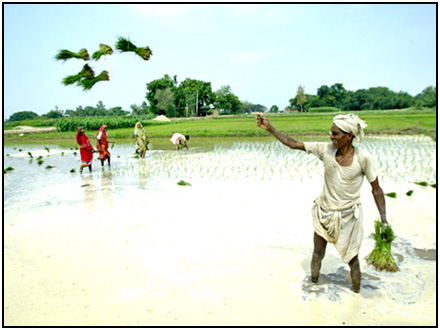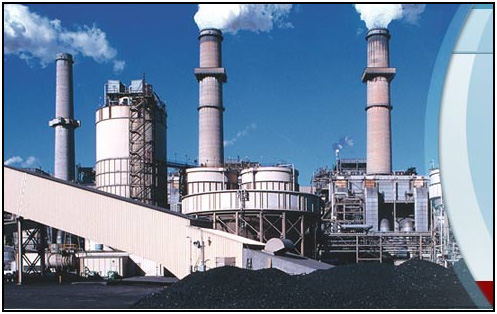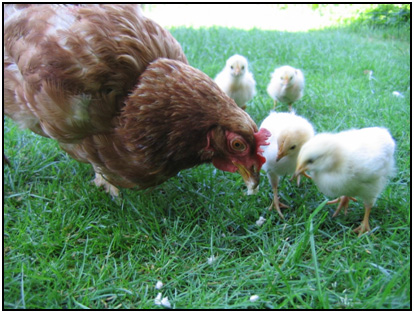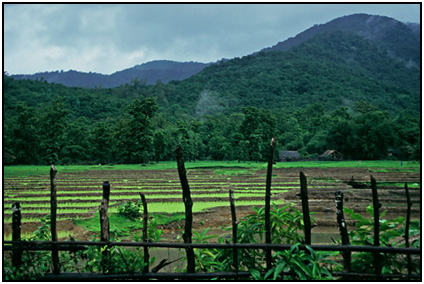My Land Will Never Keep Me and my Child Hungry

By Baptist Sequeira, Moodubelle
Bellevision Media Network
Moodubelle, 30 April 2012: Today in India what is the price of Tomato? Rs 40/kg. Potato Rs 20/kg, Sugar Rs/kg, Milk Rs 30/ltr, Mutton Rs 400/kg and the list keeps on growing indicating the price rise. Since almost 10 years we are all just watching only the price is rising but no reduction in price.
 Let us consider the situation two generations back. Each parent had 6 to 10 children. Along with parents all of them were working in their fields so most of the labor was free. The cultivation was so much that everybody had surplus and were selling it to the market. Most of the food items were less costly and were available in market. More pasture land for the live stock was available and more shepherds had more sheep with them so that abundant mutton was available in the market and for lesser price. Most of the families were raising chicken at their homes. At least 5-10 chickens were there at everyone’s house and for any occasion there was no need of buying chicken from the market.
Let us consider the situation two generations back. Each parent had 6 to 10 children. Along with parents all of them were working in their fields so most of the labor was free. The cultivation was so much that everybody had surplus and were selling it to the market. Most of the food items were less costly and were available in market. More pasture land for the live stock was available and more shepherds had more sheep with them so that abundant mutton was available in the market and for lesser price. Most of the families were raising chicken at their homes. At least 5-10 chickens were there at everyone’s house and for any occasion there was no need of buying chicken from the market.
If there was a family of workers which had no faming land to cultivate, even these labor families with additional members were available for the work in the farm. At least few of them were working in the agriculture related works. At the day end they were getting their wages paid in terms of rice, coconut, vegetables or cash from the land owner.
But gradually the conditions began to change. In view of making India a super economy, a richer country, policies have been made accordingly. But the policy makers forgot that India is an agricultural country, and has a huge human power which has to be streamlined and utilized in a proper way. They failed in diverting and the population growth of India in a better result oriented direction. They have not been able to foresee and estimate the demand for food with an increasing population and have not taken adequate measures for the production and supply of food.
Take the example of foreign policies of Manmohan Singh government. During his tenure, tax on the NRI money was removed. Globalization started, foreign companies could invest in India and could provide more jobs. More support was given to technical education than supporting agricultural and environment related education. This made more of the farmer’s children to move from village to city colleges and work in cities. Also the number of people going abroad for jobs increased.
This increasing trend has manifested serious consequences. People began to send their earnings to their families back in villages who were earlier depending on agriculture. This made the people who were working in farms to work less and less and gradually stop cultivation. Also some of the famer families migrated to cities leaving their land barren and stay with their children in cities.
 Second example of wrong policies is globalization. It contributed to a technology revolution. It led to the establishment of huge companies in the village areas like Konaje etc. which also lead to more engineering and medical colleges. Factories like cashew nuts peeling, garment etc. forced the people to move to factories instead of working in the fields. Thus, such opportunities attracted the children of famers to get gainful employment compared to the farming activities. These developments have had serious consequences that have adversely affecting the rural economic activities.
Second example of wrong policies is globalization. It contributed to a technology revolution. It led to the establishment of huge companies in the village areas like Konaje etc. which also lead to more engineering and medical colleges. Factories like cashew nuts peeling, garment etc. forced the people to move to factories instead of working in the fields. Thus, such opportunities attracted the children of famers to get gainful employment compared to the farming activities. These developments have had serious consequences that have adversely affecting the rural economic activities.
One side of this problem can be explained. Because of NRI money flow into villages, most of the farmers reduced or almost stopped the farm production. Non availability of farm-labor pushed the farm owners to gradually reduce and in some cases eventually to stop farming that resulted in the increase in fallow land which due to non-cultivation over the years has turned into barren land.
 With an increasing inflow of NRI money and a taste for luxurious living, people began to build huge and beautiful houses and others followed suit with a competitive vengeance. Raising chicken was given up so as to keep the surroundings clean. With reduction of farming manure was no longer required for agricultural purpose, hence, it was first the buffaloes and next the cows began to disappear as milk could be purchased from the dairies or available in neat packets. These factors resulted in increasing dependence of the people on market right from milk to poultry products and even vegetables.
With an increasing inflow of NRI money and a taste for luxurious living, people began to build huge and beautiful houses and others followed suit with a competitive vengeance. Raising chicken was given up so as to keep the surroundings clean. With reduction of farming manure was no longer required for agricultural purpose, hence, it was first the buffaloes and next the cows began to disappear as milk could be purchased from the dairies or available in neat packets. These factors resulted in increasing dependence of the people on market right from milk to poultry products and even vegetables.
Second side of the problem has been that the earning capacity of people rose shapely. Every person would have enough money in hand because wages started getting in terms of cash, not in terms of rice or coconuts for labors. Students got jobs and their salary has been better than the earning of a farmer or his production because they are being paid from fairly well. Thus, people have been having more cash in their hand to spend in the market. Even with the increasing inflation, people have no other option but to grumble about it a little and eventually buy the necessities from the market.
The reason for highlighting these problems is that if our society and policy makers notice this problem very late and if they are ignorant of the adverse effects of such developments coupled with an increasing population, the situation may lead to major unwanted problems for the future of India and our society. The problem of not giving a proper direction to the ever increasing population, a day may come when instead of becoming a super power, India may have to spend years in repairing the damage done to the economy of the country and provide food for millions of Indians.
Because in another 10 to 20 years most of the Indians will have at least one crore per small family and money will keep growing with the individuals. And the amount collected by way of tax will not be enough for the government to fulfill the needs of people. People may have enough money to buy food in the market, but what about the supply of food in the market if the food production terribly lags behind?
 A time may come when people may have to book rice in advance and so other food items such as groceries may be a week in advance. A day may come when there may not milk in the shop so that people may have to consume black tea. Mutton, chicken etc may have to be sold in smaller quantities. The scarcity of food may eventually lead to looting of the shops and food riots.
A time may come when people may have to book rice in advance and so other food items such as groceries may be a week in advance. A day may come when there may not milk in the shop so that people may have to consume black tea. Mutton, chicken etc may have to be sold in smaller quantities. The scarcity of food may eventually lead to looting of the shops and food riots.
Whatever the problems, they could be solved by timely intervention by the government, planners and policy makers. Few suggestions are as the following:
First of all, all the farm owners should try to grow at least one crop per year by cultivating rice or vegetables or grains, so that they can have a very good quality rice at home. Fresh vegetables can be grown to maintain good health and enjoy seasonal eating traditions like sweet potato, cucumber, during rain, green gram juice during summer and tastiest idlies from home grown black gram.
Secondly, the retired employees can plan for a good house back at the farm land. It would give a tremendous pleasure if they could maintain cows for fresh and healthy milk. A soft cry of a calf at home would refresh the mind every time. Wouldn’t it be beautiful to see a battalion of chicken walk around the house whole day and cocks awakening the household in the morning by its melodious voice?
 Thirdly, the policy makers must think in many angles while making the policies, which must have foresight by providing a proper direction to the ever increasing population. They must encourage agricultural workers by providing more subsidies, more loans, free medical coverage and providing free good quality veterinary medicines to their cows and fertilizers to their crops. Government must provide extra bonus money to the farmers instead of providing huge funds to unproductive activities. Government must provide good market facilities for the farmers to sell their products without resorting to middle-men.
Thirdly, the policy makers must think in many angles while making the policies, which must have foresight by providing a proper direction to the ever increasing population. They must encourage agricultural workers by providing more subsidies, more loans, free medical coverage and providing free good quality veterinary medicines to their cows and fertilizers to their crops. Government must provide extra bonus money to the farmers instead of providing huge funds to unproductive activities. Government must provide good market facilities for the farmers to sell their products without resorting to middle-men.
Finally, the present generation parents have a higher responsibility. Parents should think in terms of providing food security. Those people with farming background should make sufficient savings and return to their homes and invest part of their savings in continuing or reviving the farming tradition. The children should be advised in such a way that they must keep the interest in their farming tradition.
Mother Earth, that had been fertile and rich but has fallen into disuse and barrenness cries each day and beacons her children to return to their land and once again drape her in greenery with renewed agricultural activities which would provide them food and security.




 Write Comment
Write Comment E-Mail To a Friend
E-Mail To a Friend Facebook
Facebook Twitter
Twitter  Print
Print 















HI, i have read u r article its very intersting.I too feel agriculture is the future of our LIFE. THANK YOU